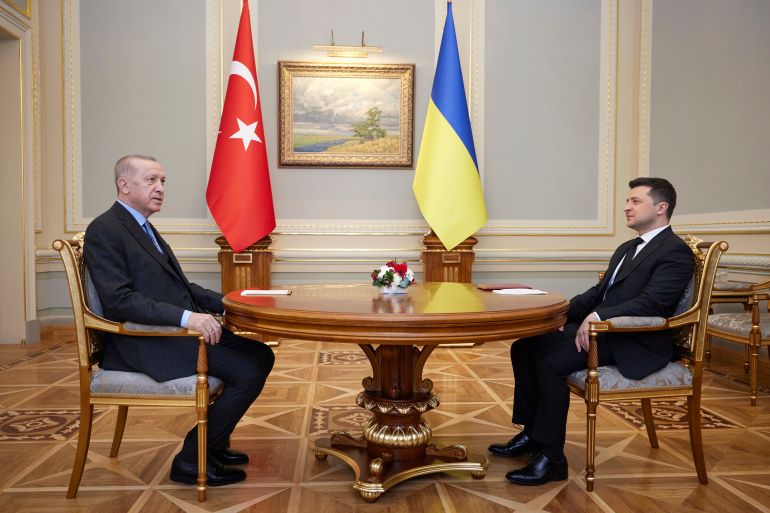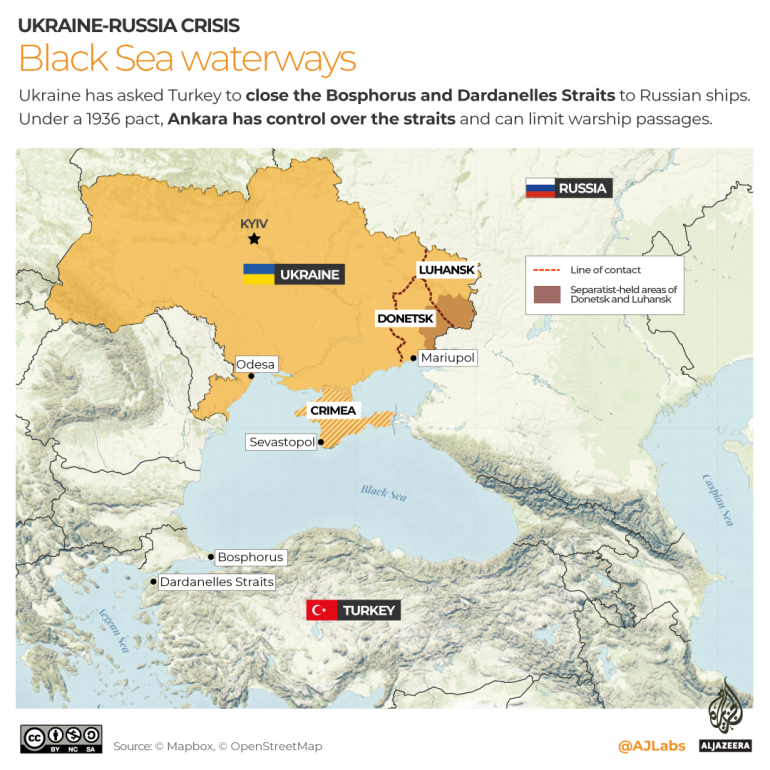Ukraine asks Turkey to shut Black Sea waterways to Russian ships
Ambassador Vasyl Bodnar says Kyiv has called on Ankara to close ‘the airspace, Bosphorus and Dardanelles straits’.

Ukraine has asked Turkey to close the Bosphorus and Dardanelles straits to Russian ships, Kyiv’s ambassador to Ankara has said, as Russia launched air and ground assaults on its neighbour.
The request on Thursday puts NATO member Turkey, which shares a maritime border with Ukraine and Russia in the Black Sea and has good relations with both countries, in a difficult position.
Keep reading
list of 3 itemsRussia invades Ukraine: What’s next for energy oil prices?
Russia invades Ukraine: What we know so far in 500 words
Under the 1936 Montreux Convention, Ankara has control over the straits and can limit warship passages during wartime or if threatened.
“We are calling for the airspace, Bosphorus and Dardanelles Straits to be closed. We have conveyed our relevant demand to the Turkish side. At the same time, we want sanctions imposed on the Russian side,” Ambassador Vasyl Bodnar told a news conference in Ankara.
There was no immediate statement by the Turkish government. Ankara on Thursday advised its citizens in Ukraine to stay at home or in a safe place and avoid travelling after airlines cancelled flights due to the closure of Ukraine’s airspace.
Turkish President Recep Tayyip Erdogan also convened a summit of top security officials for 08:00 GMT to discuss the Russian offensive, his office said.
Turkey has opposed sanctions on Russia, and has been calling for NATO and Russia to tone down their rhetoric. Erdogan said last month Turkey was “ready to do whatever is necessary” to avoid a war, but Ankara has also described Russian steps against Ukraine as unacceptable.
While building close cooperation with Russia on defence and energy, Turkey has also invested in the Ukrainian defence industry. It has also sold sophisticated drones to Ukraine and signed a deal to co-produce more, angering Moscow.
Earlier this month, six Russian warships and a submarine transited the Dardanelles and Bosphorus Straits to the Black Sea for what Moscow called naval drills near Ukraine waters.

Under the 1936 accord, Turkey has control over the Bosphorus and Dardanelles and the power to regulate the transit of naval warships. It also guarantees the free passage of civilian vessels in peacetime and restricts the passage of ships not belonging to countries bordering the Black Sea.
In wartime, or when it is threatened by aggression, Turkey is authorised to close the straits to all foreign warships. It can also refuse transit for merchant ships from countries at war with Turkey and to fortify the straits in case of conflict.
All non-Black Sea countries wishing to send vessels must notify Turkey 15 days in advance, while Black Sea nations must give eight days notification.
Passage is limited to nine warships of a specific aggregate tonnage at any one time, with no ship above 10,000 tonnes allowed to pass. A non-Black Sea country’s ships cannot exceed a total of 30,000 tonnes at any time, and the vessels are allowed to stay in the region no more than 21 days. Black Sea states may transit ships of any tonnage.
Black Sea countries can send submarines through the straits with prior notice, as long as they have been built or bought by them or sent for repair outside the Black Sea.
Civil aircraft can be transited along routes authorised by the Turkish government. The accord does not contain restrictions on the passage of aircraft carriers, but Ankara says it has control over that as well.